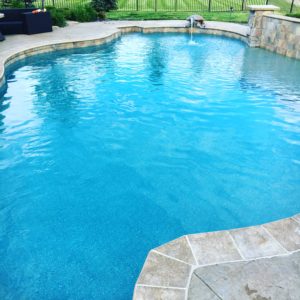Calcium hardn ess is defined as the measure of the amount of dissolved calcium in your pool water. It is often referred to as the ability of water to later with soap. Think of water running through a water softener, once drop of detergent will produce a lot more bubbles than traditional well or city water.
ess is defined as the measure of the amount of dissolved calcium in your pool water. It is often referred to as the ability of water to later with soap. Think of water running through a water softener, once drop of detergent will produce a lot more bubbles than traditional well or city water.
Calcium hardness lower than 100ppm makes water soft and will draw lime out the pool surfaces. Amounts higher than 400ppm can cause deposits to form on pool surfaces. Keep the calcium hardness in balance to prevent scaling and etching.
A combo of low pH with low alkalinity and low calcium hardness will cause water to become aggressive.
What is the cause? The two main elements of hardness in water are calcium and magnesium. Pools that have low calcium hardness levels will start to dissolve calcium out of the pool surface, whether pebble, plaster, tile, stone, concrete or even some fiberglass surfaces. You can prevent that from happening by keeping your calcium hardness levels at the proper level for your pool surface.
How do I adjust calcium hardness? Calcium hardness is increased with calcium chloride. The best way to reduce calcium hardness is to drain some water and replace it with fresh water. Be sure to know the water source you are using and make sure it’s not high in minerals. Calcium hardness reducers can also be used. They contain chelating agents that bond with the calcium to keep it trapped in the solution.
